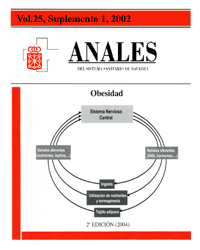Role of uncoupling proteins in obesit
DOI:
https://doi.org/10.23938/ASSN.0815Keywords:
Proteínas desacoplantes. Termogénesis. Obesidad.Abstract
The discovery of a protein of the internal mitochondrial membrane of the brown adipocytes, the UCP1, marked an important advance in the understanding of the thermogenic process, as well as of the working of the brown adipose tissue. This protein is only of importance in the newly born and small animals, however the later discovery of proteins that were analogues of UCP1 (UCP2, widely distributed, and UCP3, mainly present in the muscle) with a similar functioning and also present in human tissue, created new perspectives and scientific goals. These proteins uncouple the respiratory chain of the oxidative phosphorylation, thus dissipating energy in the form of heat without producing ATP, by means of a mechanism that is still the subject of debate. From the studies of regulation that have been made, it emerges that their activity is modified when facing different physiological and nutritional stimuli, with greater activity observed in situations where an increase of energy expenditure is required. The studies carried on humans seem to corroborate the results obtained in experiments on animals, and action can thus be proposed on the activity, or the quantity, of these proteins in humans, as a means for fighting overweightedness and obesity. However, there is still an evident need to complete and improve the existing information on the importance of these proton transporting proteins in humans.Downloads
Downloads
Published
How to Cite
Issue
Section
License
La revista Anales del Sistema Sanitario de Navarra es publicada por el Departamento de Salud del Gobierno de Navarra (España), quien conserva los derechos patrimoniales (copyright ) sobre el artículo publicado y favorece y permite la difusión del mismo bajo licencia Creative Commons Reconocimiento-CompartirIgual 4.0 Internacional (CC BY-SA 4.0). Esta licencia permite copiar, usar, difundir, transmitir y exponer públicamente el artículo, siempre que siempre que se cite la autoría y la publicación inicial en Anales del Sistema Sanitario de Navarra, y se distinga la existencia de esta licencia de uso.








